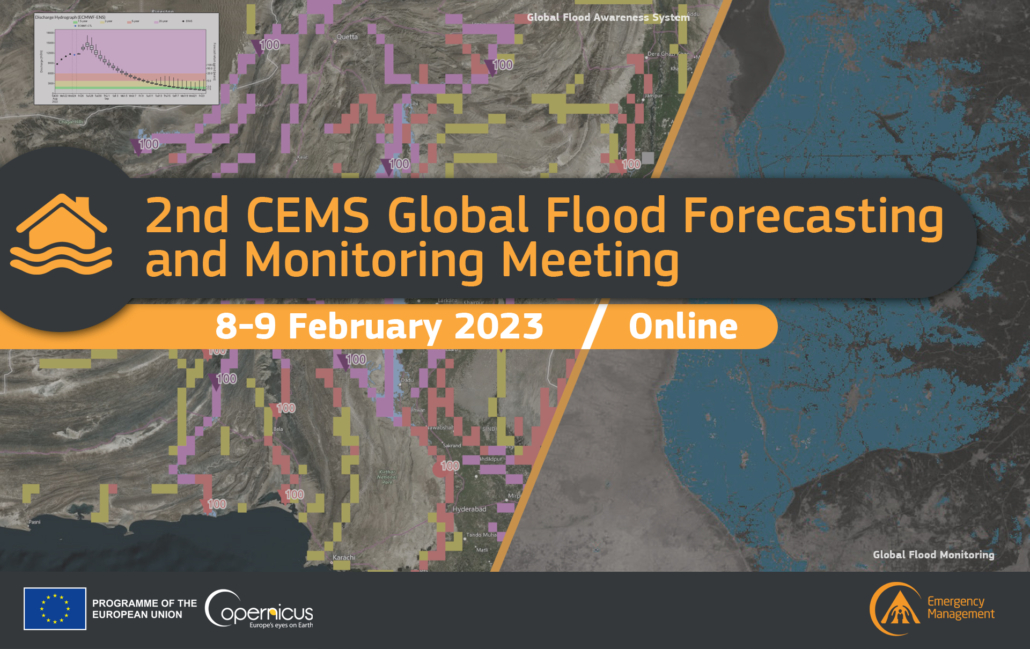The Copernicus Emergency Management Service (CEMS) is organising the ‘2nd Global Flood Forecasting and Monitoring Meeting’ which will be hosted online via Zoom Webinar and the Gather.Town platform on Wednesday 08 and Thursday 09 February 2023.
To register for the event, please click on the Zoom Webinar registration link to enter your details. Registration for the workshop will remain open until the 31 January 2023.
The event focuses on recent advances in global flood forecasting and monitoring. The workshop will include sessions on new developments to the Global Flood Awareness System (GloFAS) and the Global Flood Monitoring (GFM) products, to data access, use cases and applications, and open panel discussions.
Two sessions are scheduled over the two days of the workshop to accommodate people working in different time zones. The presentations will be held from 13:00 to 17:00 (UTC) during both days of the event. A draft agenda can be found below. The full agenda of the workshop will be made available to all registered participants shortly before the event.
The format of the workshop will be highly interactive, including discussions and booths in Gather.Town. Participants will have opportunities to connect with people from the GloFAS and GFM communities to discuss their work and expand their networks.
Day 1: 8 February 2023
| Time (UTC) | Topic | Presenter |
| 13:00 – 13:05 | Opening and welcome | Peter Salamon (EC JRC) |
| 13:05 – 13:20 | A short intro to the Global Flood Awareness System GloFAS | Christel Prudhomme, (ECMWF) |
| 13:20 – 13:40 | What’s new in GloFAS v4.0? | Stefania Grimaldi (EC JRC) |
| 13:40 – 14:00 | A detailed look at the new Global Flood Monitoring (GFM) product | Christian Krullikowski (German Aerospace Center) |
| 14:00 – 14:30 | Use cases and applications (IGNITE talks – 5 mins each):
1. Improving flood early warning systems through the combined use of GLOFAS, archived information and hydrological modelling 2. Exemplary evaluation results of the Global Flood Monitoring (GFM) product for applications in German federal agencies 3. Flood depth estimation from GFM and global DEMs 4. Operational bias correction tool for GeoGlows and Glofas forecasts 5. Multi-reservoir system operation in the Zambezi River Basin using global hydrological forecasts 6. Computing flood hazards and impacts using GloFAS data and CLIMADA |
1. Juan Villagran De Leon (UN-SPIDER)
2. Silke Mechernich (BAFG) 3. Arjen Haag (Deltares) 4. Dr. Amir Givati (Tel Aviv University) 5. Dr. Andrea Ficchi (Politecnico di Milan) 6. Lukas Riedel (ETH Zürich / Federal Office of Meteorology and Climatology, MeteoSwiss) |
| 14:30 – 15:15 | Panel discussion: #EarlyWarning4All – How can GloFAS and GFM contribute to the UN Global Early Warning Initiative? | Monica Turner (UN Office for the coordination of Humanitarian Affairs)
Stefan Uhlenbrook (World Meteorological Organization) Abdou Ali (AGRHYMET CCR AOS) |
| 15:15 – 15:25 | Creating flood event based information merging GloFAS, GFM and media sources | Milan Kalas (EC JRC) |
| 15:25 – 15:35 | Presentation of Gather.Town activities and transfer to Gather.Town | Karen O’Reagan (ECMWF) |
| 15:35 – 17:00 | Join us in Gather.Town! Check out our booths, ask questions and discuss with us! | |
Day 2: 9 February 2023
| Time (UTC) | Topic | Presenter |
| 13:00 – 13:05 | Welcome Day 2 and recap Day 1 | Peter Salamon (EC JRC) |
| 13:05 – 13:20 | ARC flood insurance product which relies on GLOFAS (to be confirmed) | Charles Serele (African Risk Capacity) |
| 13:20 – 13:35 | Impact-based multi hazard forecasting in Africa | Lorenzo Alfieri (CIMA Foundation) |
| 13:35 – 13:50 | The new GFM archive (incl. Q&A) | Bernhard Bauer-Marschallinger (TU Vienna) |
| 13:50 – 14:05 | Accessing and using GFM data | Michaela Seewald (GeoVille) |
| 14:05 – 14:15 | Using the C3S Climate Data Store to access GloFAS data | Edward Comyn-Platt (ECMWF) |
| 14:15 – 14:25 | The new GloFAS user guide | Nina Bosshard, SMHI |
| 14:25 – 15:00 | Use cases and applications (IGNITE talks – 5 mins each):
1. Flood Foresight: Extending GloFAS for forecast-based financing and parametric insurance applications (tbc) 2. GloFAS dataset for flood frequency analysis in data-sparse regions of Iran 3. Compound flood modelling/forecasting where one could use GloFAS forecasts as boundary condition or GFM products as validation (tbc) 4. Pakistan Floods case (tbc) 5. Advanced Disaster Analysis and Mapping (ADAM) for flood monitoring and response |
1. Dr. John Bevington (JBA Consulting)
2. Ass. Prof. Asghar Azizian (Water Engineering Department, IKIU University, Iran) 3. Dr. Albrecht Weerts (Deltares) 4. Rachel Abela (DG ECHO, EC) 5. Michael Manalili (UN World Food Program) |
| 15:05 – 17:00 | Join us in Gather.Town! Check out our booths, ask questions and discuss with us! | |



